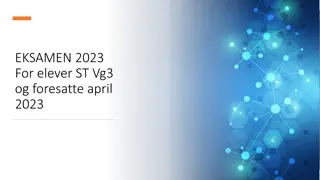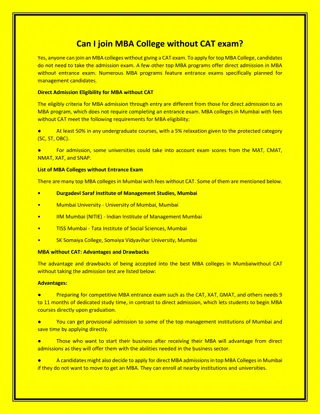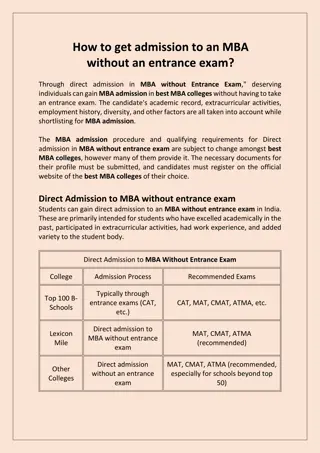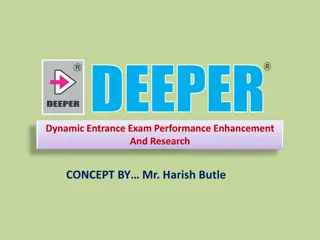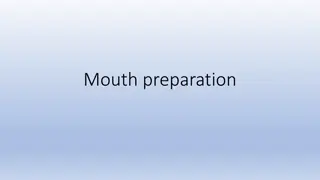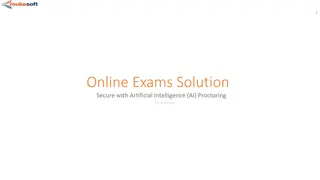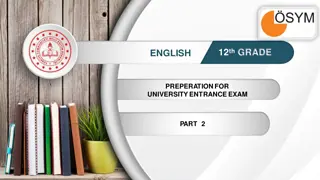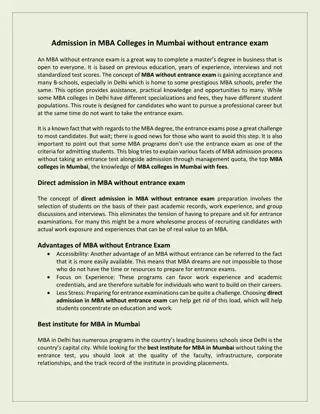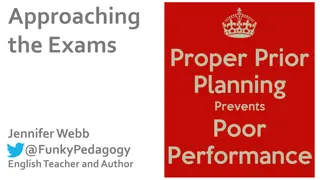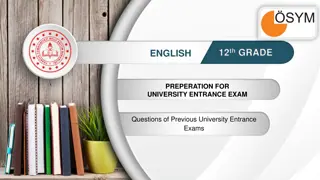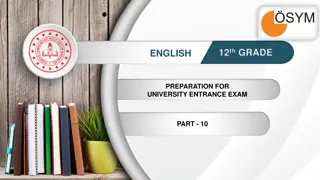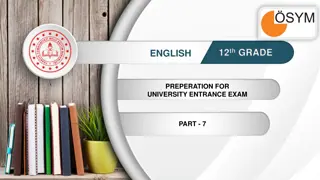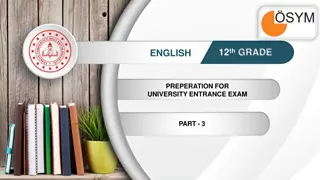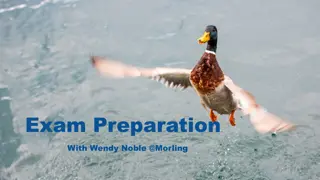Guide to College Preparation and Entrance Exams
Discover the essential steps for college preparation, including taking advanced placement tests, college entrance exams, and submitting applications for financial aid and scholarships. Learn about the different paths available post high school, such as technical college, military service, and pursuing two-year or four-year degrees. Get insights on standardized tests, college admissions checklists, and the importance of the PSAT/NMSQT exam for junior year students aiming for a four-year college.
Download Presentation

Please find below an Image/Link to download the presentation.
The content on the website is provided AS IS for your information and personal use only. It may not be sold, licensed, or shared on other websites without obtaining consent from the author.If you encounter any issues during the download, it is possible that the publisher has removed the file from their server.
You are allowed to download the files provided on this website for personal or commercial use, subject to the condition that they are used lawfully. All files are the property of their respective owners.
The content on the website is provided AS IS for your information and personal use only. It may not be sold, licensed, or shared on other websites without obtaining consent from the author.
E N D
Presentation Transcript
Test Preparation
Introductions Our GEAR UP Team includes:
oWhen we say college, we mean any type of education or training after high school. We also use the terms postsecondary education and postsecondary training . oThere are many options for students after high school, including apprenticeships, military, on-the-job training programs, community college certificates, two-year degrees, and four- year degrees. oThe term college includes all of these things. Each of these paths has entrance requirements. These requirements vary by institution. What do we mean when we say college?
Take Advanced Placement (AP) tests, if applicable Take college entrance exam(s) (SAT and/or ACT) Complete and submit college applications Complete and submit the FAFSA Complete and submit applications for private scholarships More information is available from the College Board: Applying 101 : https://bigfuture.collegeboard.org/get- in/applying Financial Aid 101 : https://bigfuture.collegeboard.org/pay-for- college/financial-aid College Admissions Checklist
A standardized test compares students across the state, country and internationally. What is a college entrance exam? Offered on several dates throughout the school year (not during summer vacation). Required by most four-and two- year colleges and military.
Technical college Military 2-year 4-year Exams PSAT, SAT, SAT Subject Exams ASVAB ACCUPLACER ACCUPLACER or other community college assessment or other community college assessment ACT Aspire, ACT
If students are planning to attend a four- year college, take the PSAT in fall of junior year. Taking the PSAT/NMSQT again in 11th grade gives students a fresh skills assessment and a measure of their progress, as well as the chance to compete for scholarships. Research shows that students who take the PSAT/NMSQT in both 10th and 11th grades score higher on the SAT than students who do not. The PSAT/NMSQT, which will help students prepare for the SAT. It could also qualify students for the National Merit Scholarship Competition. PSAT/NMSQT: Fall of Junior Year
Most four-year colleges require that students submit SAT or ACT scores. Some colleges require or recommend that you take SAT Subject Tests. Take the SAT and/or ACT in spring of junior year. Students may test or retest in 12th grade. SAT or ACT 11th and/or 12th grade
ACCUPLACER, ASSET, or other community college assessment Two-year colleges often require this assessment. Check with the college to determine what assessments are required. Take fall of senior year. 11th or 12th grade
The ASVAB is designed to predict success in the military, while the ACT and SAT are designed to predict success in college. Take the ASVAB in spring of junior year for practice. Take fall of senior year. Scores are good for up to two years. ASVAB 11th or 12th grade
Insert dates Test dates
Registration Fee: Exams require a registration fee to sign up. Late Fees: Deadlines are strictly enforced. Change Fees: Any change to the original registration results in an added fee. Costs include
If paying for the tests is difficult, never fear! You have options: Fee waivers are available via your counselor. Free & Reduced lunch qualification. GEAR UP fee waivers. Make sure to take advantage of these opportunities well before the registration deadlines. Fee waivers
AP test fee waivers are available for eligible students with no limit on the number of waivers per student. To qualify for an AP exam fee waiver, the student receives or is eligible to receive free or reduced price lunch or meets other criteria. Waivers are administered at the school; speak with your school s AP test coordinator. Insert contact name http://www.k12.wa.us/AdvancedPlacem ent/testfee.aspx Advanced Placement (AP) Exams
To qualify for an ACT fee waiver, the student: Must be enrolled in high school in the 11th or 12th grade Be a United States citizen or testing in the United States, US territories, or Puerto Rico. Must meet one or more of the following indicators of economic need: Student is receiving free/reduced lunch. Family income is below the USDA reduced-price lunch level. Student is enrolled in TRIO or a similar program. Family lives in subsidized housing or receives public assistance. Student is experiencing homelessness. Student is living in a foster home. Student is a ward of the state or is an orphan. ACT
oCan use the waiver to take the ACT up to 2x. oStudents must access the waiver from the school counselor, not from ACT. oThe waiver must be signed by the student and school counselor. oCovers the basic test fees, including sending the test score(s) to up to 4 colleges. ACT oDoes not cover late registration fees or change fees. oSee: www.act.org/content/dam/act/unsecured/docu ments/FeeWaiver.pdf
To qualify for an SAT fee waiver, the student must: Be enrolled in high school in the 11th or 12th grade (SAT) or in grades 9-12 (SAT Subject Tests). Be a U.S. citizen or be testing in the U.S., Puerto Rico, or a U.S. territory. Meet one or more of the following indicators of economic need (same as for the ACT) Student is receiving free/reduced lunch. Family income is below the USDA reduced- price lunch level. Student is enrolled in TRIO or a similar program. Family lives in subsidized housing or receives public assistance. Student is experiencing homelessness. Student is living in a foster home. Student is a ward of the state or is an orphan. SAT
The waiver must be obtained from the student s high school counselor or an authorized agency, not from the College Board. To be valid, the waiver must be completed by the high school guidance counselor. The student can receive up to four waiver cards: Up to 2 waivers for the SAT and 2 waivers for SAT Subject Tests. SAT
Covers the basic test fees, including sending the test score(s) to up to four colleges; up to four Request for Waiver of College Application Fee forms, and a $40 discount for the Official SAT Online Course; does not cover late registration fees or change fees College application fee waivers should be included with the students college applications and sent to colleges included in the Directory of Colleges Cooperating with the SAT Program Fee- Waiver Service Additional information is available at http://sat.collegeboard.org/register/sat- fee-waivers SAT
If you need accommodations (extra large test book, extra testing time), you can apply for them. Work with your counselor to apply. Usually paperwork needs to be submitted at least six months in advance. Keep in mind, some accommodations mean you ll be testing for a longer timeframe. Testing accommodat ions
Use free online sources to become familiar with the test directions, test format and the types of questions asked. Take timed practice tests. Believe it or not, taking state exams like the SBA or course exams like AP tests can improve your ability to test well on the SAT/ACT. Why? Every time you take a standardized- type test, you practice the skill of taking standardized-type tests. This phenomenon also works in the reverse. Test preparation
AP : https://www.khanacademy.org/ SAT: https://www.khanacademy.org/test- prep/sat Free online practice ACT: www.act.org/academy ACCUPLACER: https://accuplacer.collegeboard.org/student/pra ctice ASVAB: http://official-asvab.com/index.htm
GEAR UP services and activities Insert services and or activities you plan to offer
Dates, deadlines and costs
Contact information: [insert counselor/advisor/mentor name] Phone: (xxx) xxx-xxxx E-mail: xxxx@xxxx.xxx Thanks for coming
Topic Next Family Night Date




